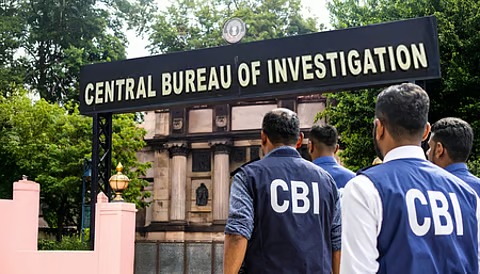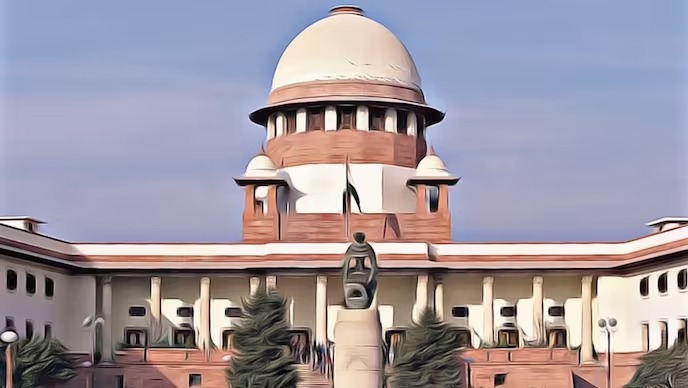@JUDGMENTTAG-ORDER
Ajit Kumar Sinha, J.@mdashThe present writ petition has been preferred for the following reliefs:
(a) For quashing the order dated 30.3.1995, issued under the signature of respondent No. 3, whereby the services of the petitioner has been terminated in most illegal and arbitrary manner and the entire departmental proceeding is in utter violation of the principles of natural justice; and
(b) For quashing the order dated 31.7.2003, issued by respondent No. 3, whereby respondent has dismissed the representation filed by the petitioner in pursuance of the order dated 8.5.2003, passed in W.P.(S) No. 2246 of 2003.
2. The facts, in brief, are set out as under:
The petitioner was appointed as Post-time rated worker on 9.5.1989. His wife died on 18.6.1994 and the local police implicated him and, accordingly, he was arrested on 19.6.1994. According to the petitioner, he being a simple tribal could not write any letter to the respondents but communicated the fact of his arrest through the local persons. Sessions Trial No. 405 of 1994 for the offence u/s 302 of the Indian Penal Code in the court of learned 1st Additional Sessions Judge, Hazaribagh, was initiated and the learned Sessions Court vide its order dated 10.7.1997 acquitted the petitioner from the charges. Upon acquittal he went to the office of the respondents and gave his joining on 14.7.1997, which was refused by the respondents and instead he was supplied with a termination order dated 30.3.1995, which was issued behind his back, wherein no reason was assigned.
3. The main contention raised by the petitioner is that neither there was any enquiry report nor any charge sheet nor any reason assigned nor any show cause was issued for which his services were terminated. In spite of repeated requests nothing happened and thereafter, he was constrained to file W.P.(S) No. 2246 of 2003, which was disposed of by this Court vide order dated 8.5.2003, directing the respondents as under:
If any application is preferred by petitioner against the order of removal dated 30th March, 1995 before the Project Officer, Sarubera Colliery, Kuju Area, District Hazaribagh he will take into consideration the aforesaid facts and will decide whether the order of removal requires to be reviewed or recalled or not, within a period of three months from the date of receipt of representation.
4. On 24.5.2003 the petitioner gave his representation but the respondents again rejected die representation and for the first time along with the said letter memo of charges and enquiry report were supplied to the petitioner.
5. Upon perusal of the enquiry report etc. it was found that there was no documentary evidence and only on the basis of the argument of the Presenting Officer a finding was given, which in any case was falsified by the subsequent notings.
6. It appears that there was a departmental proceeding initiated on the ground of unauthorized absence and, according to the respondents, they have sent notice at his permanent address but not in the official quarter nor any paper publication was made. Even the finding of the enquiry officer is based on the argument of the Presenting Officer and it is a case of no evidence and the petitioner has specifically submitted that he was under treatment in the hospital of the respondent authorities itself and he was advised rest for three months. In the aforesaid background the petitioner has challenged the exparte order of termination dated 30.3.1995 for which his representation was rejected on 31.7.2003.
7. The main contention raised by the petitioner is that the entire action of the respondents was violative of the cardinal principles of natural justice, apart from being arbitrary, illegal and violative of Article 14 of the Constitution of India. It has also been stated that not even a show cause notice was issued nor a charge memo was served nor any explanation was called and the alleged notice was sent at his permanent address even though he was living in the official quarter of the respondent authorities. It has also been submitted that even the absence for three months initially was at the instance of the Medical Officer of the respondent authorities and, thus, he was entitled to be reinstated with full back wages and continuity in service. He has also submitted that there was a very good service record and no adverse entry was recorded in his service book.
8. The respondents in their counter affidavit have submitted that the Writ petition was not maintainable and the proper forum was to raise an industrial dispute. It has further been submitted that the petitioner as per the charge sheet was guilty of unauthorized absence and it is in these backgrounds that the termination order cannot be reviewed or recalled.
9. I have considered the pleadings and the rival arguments of the parties. Before dealing with the merits of the matter it will be relevant to quote the discrepancies in the counter affidavit filed by the respondents which is not only misleading but also false. The stand of the respondent is self contradictory, which will be evident on reading the following. In the counter affidavit at paragraph 12 it is stated as under:
That the petitioner was issued a charge sheet dated 11.11.1994 alleging the misconduct of unauthorized absence from duty w.e.f. 1.11.1993 and also the charge of habitual absence.
It is relevant to mention that the said charge sheet was sent to the petitioner, both at his present and also permanent address.
Again at paragraph 19 of the counter affidavit on oath it is stated as under:
That in respect of the aforesaid allegations, it is stated that the chargesheet dated 11.11.1994 was sent to the petitioner to his permanent address and further the memo constituting the enquiry was also sent to his permanent address by postal services. It is further stated that notice of enquiry officer fixing date of enquiry for 21.1.1995 and 5.2.1995 was also sent to his permanent address.
10. However, in Annexure-E at page 27 of the counter affidavit, which is an office order issued by the Officer/Colony Manager/Som Sarubery Colliery dated 28.12.1994, appointing Shri V.K. Srivastava as Enquiry Officer, strangely it is stated as under:
He has submitted his reply vide letter No. Nil dated Nil to the aforesaid charge sheet. His reply has not been found satisfactory. After carefully considering his explanation, I feel that there are reasonable ground to proceed further and hold an enquiry into the charges listed in the aforesaid charge sheet. Accordingly, I hereby appoint Shri V.K. Srivastava an Enquiry Officer.
11. The aforesaid three quoted paragraphs of the counter affidavit speak volumes about the malafide and the way the respondents have proceeded and in fact have tried to mislead this Court. The fact remains that the alibi of unauthorized absence appears to be false since no period has been specified nor the days of absence has been specified and only a bald statement has been made that he was absent from the date with effect from 1.11.1993.
It is strange that at one place the respondents say that the charge sheet and other proceedings initiated, including the termination order, were sent to his permanent address but they failed to substantiate it by filing any proof and at the same time when they say that they were not aware as to whether the petitioner was in jail, then certainly it would have been easier for them to serve it in the official quarter, which must be the know-how of the respondents. The appointment order of the Enquiry Officer suggests that the petitioner has filed his reply to the charge sheet and the same was considered and found not satisfactory whereas in all other statement on affidavit as well as the office order it is mentioned that the proceedings were completely exparte.
12. Thus, the counter affidavit on oath is on the face of it incorrect. The impugned order, rejecting the representation of the petitioner, is on the ground that this was a case of unauthorized habitual absence and the termination is not based on the charges of criminal proceeding and it is in these background that the Project Officer expressed his inability to interfere with the order of termination dated 30.3.1995. The aforesaid finding on the ground that this was the order passed by the High Court on 8.5.2003 is on the face of it erroneous and unsustainable. In fact, the High Court also recorded the fact that it was not clear as to what was the charge for which the petitioner was removed. It nowhere says that the representation can be considered only if the termination was based on criminal proceedings.
13. Considering the aforesaid facts and circumstances of the case and, in particular, the conduct of the respondents in filing false affidavit with impunity the impugned order dated 31.7.2003 and the termination order dated 30.3.1995 are, on the face of it, arbitrary, illegal being violative of the cardinal principles of natural justice and Article 14 of the Constitution of India, which are accordingly quashed and consequently the petitioner is entitled to be reinstated with all consequential benefits.
14. This writ petition is, accordingly, allowed with cost.

